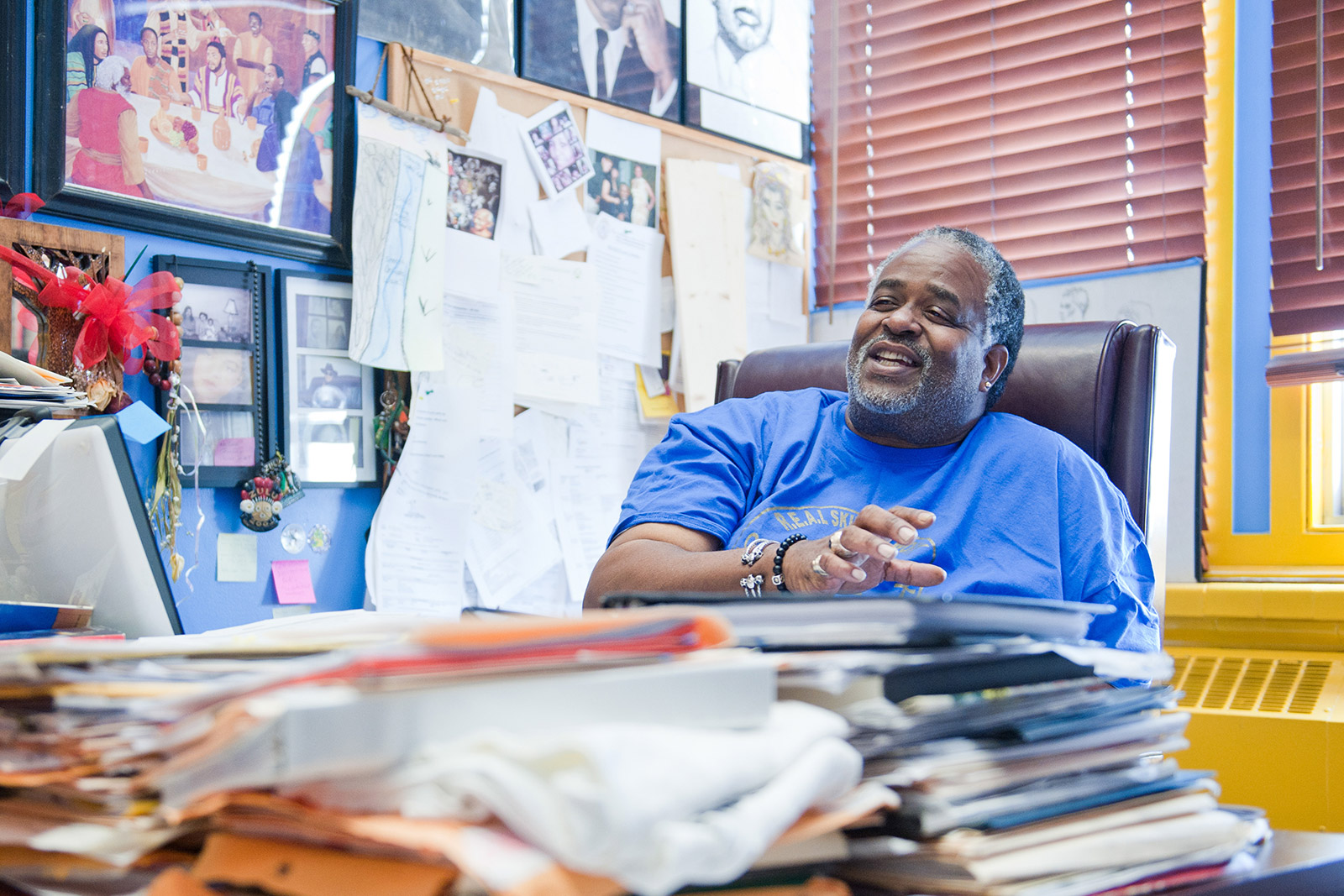Ford Scholars ProgramCombining Scholarship and Activism Looking to the Future of the REAL SKILLS Network
Ford Scholars ProgramCombining Scholarship and Activism Looking to the Future of the REAL SKILLS Network
More than a decade ago, ex-prison-inmate-turned-social-activist Theodore “Tree” Arrington founded REAL (Relationship Empowerment Affirmation Leadership) Skills Network, a place where Poughkeepsie’s at-risk children could find help with their schoolwork and an outlet for their artistic creativity. “I wanted to provide something I saw was missing in schools,” Arrington says. “Schools are caught up in having kids pass a test. I want them to pass in life.”

Drawing on support from numerous sources, including Vassar, Arrington and his staff have provided after-school and summer educational, arts, and recreational programs for hundreds of young people, and many of them have returned as teenagers and young adults to become counselors and mentors for those who came after them.
Arrington credits Vassar with helping REAL Skills to fulfill its mission—its students have volunteered there since its inception—so he says it’s only fitting that Associate Prof. of Anthropology Candice Lowe Swift and two Vassar students are assessing the agency’s programs and activities and preparing a report on how it can continue to grow and sustain itself in the future. “This place was created in large part by Vassar, so feedback from Vassar is essential,” Arrington says.
The students, Daniela Calderon ’18 and Nicolas Gedigk ’19, are working on the project this summer under the auspices of Vassar’s Ford Scholars program. Lowe Swift has been involved in various capacities with REAL Skills over the past 10 years. She has supervised several students’ field work there and taught a course at Vassar using REAL Skills as a vehicle for service-based opportunities for her students, and she recently joined the agency’s board of directors.

“Joining the board and sending Nic and Daniela there is just the most recent expression of my relationship and my students’ relationship with REAL Skills,” she says. “I keep going back and sending students not only because I am interested in seeing the agency flourish but also because every one of my students who has volunteered or done research with REAL Skills has grown in a variety of ways as a result.”
Calderon, a political science major from North Bergen, NJ, and Gedigk, an anthropology major from Larchmont, NY, call their experience working with the children and staff at REAL Skills life-changing. “It opens your mind,” Gedigk says. “The interpersonal relationships and interactions we’re having there change the way you think.”

Calderon agrees. “Candice emphasizes that the nature of anthropology is community involvement,” she says. “The work we did this summer was hard but gratifying. I wish more Vassar students could be exposed to community outreach programs like this, so when they graduate they can say not only, ‘I went to Vassar,’ but ‘I learned about my community.’”
Calderon and Gedigk said one of the hallmarks of the culture at REAL Skills is taking immediate action when you see something that needs improvement. This was reinforced for them first-hand when they told Arrington they thought some aspects of a fledgling STEM (Science, Technology, Engineering, and Math) program could be improved. Arrington told them to figure out those improvements themselves. “We stayed until after 8 o’clock that night devising a training program for the mentors,” Calderon says.
After they finish their work at the agency this summer, Calderon and Gedigk will work with Lowe Swift to outline their observations and preliminary assessment of the agency for Arrington and the board, and they plan to publish a paper about their experience in a peer-reviewed academic journal.
Calderon says one of the biggest challenges the agency faces is finding a successor for Arrington when he decides to step down. “Going forward, we have to look at the future without Tree,” she says, “and that’s going to be hard because he’s the heart and soul of the place. The next person who runs it will have to be just as invested in the community, and that’s probably going to be an alum of the program.”

Calderon and Gedigk have interviewed participants and staff members for their study and hope to talk to parents and former participants as well before they draft their report.
Lowe Swift says she knew Calderon and Gedigk brought different skills to their work and wondered how they would interact. She says she was impressed with how the two had collaborated. “I had had Daniela in class and knew what strengths she would bring as a social analyst,” she says. “And I had been the faculty supervisor on Nic’s study of caregiving at a residential community for adults with disabilities in Germany. I knew that he was a skilled ethnographer. I didn’t know if there would be tension between the two students because they have such different personalities, but it was beautiful to see how they complemented each other. They were better researchers because they consistently shared their different perspectives on the activities and events taking place at REAL Skills.”
Lowe Swift says the project the Ford Scholars undertook had much in common with others undertaken by Vassar students at REAL Skills: It was mutually beneficial. “We’re doing something for the agency,” she says, “and at the same time, Nic and Daniela are becoming better global citizens. They’re getting a glimpse of how to combine scholarship with social activism.”